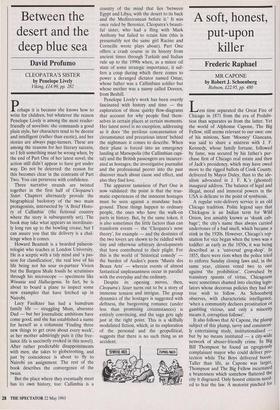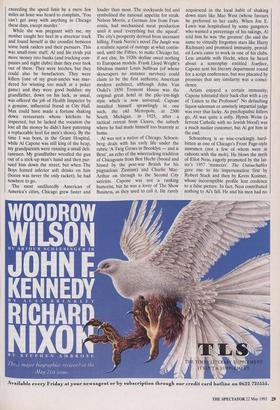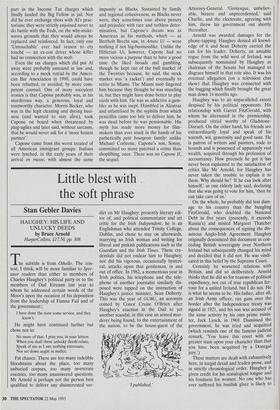A soft, honest, put-upon killer
Frederic Raphael
MR CAPONE by Robert J. Schoenberg Robson, £22.95, pp. 480
ess time separated the Great Fire of Chicago in 1871 from the era of Prohibi- tion than separates us from the latter. Yet the world of Alphonse Capone, The Big Fellow, still seems relevant to our own: one of his minions, Sam 'Mooney' Giancana, was said to share a mistress with J. F. Kennedy, whose family fortune, followed by fame, was secured by his father's pur- chase first of Chicago real estate and then of Jack's presidency, which may have owed more to the rigged ballots of Cook County, delivered by Mayor Daley, than to the ide- alism advocated in J. F. K.'s (ghosted) inaugural address. The balance of legal and illegal, moral and immoral powers in the USA is delicate to the point of symbiosis.
A regular vote-delivery service is an old Chicago tradition. Polite legend says that Chickagou is an Indian term for Wild Onion, less amiably known as 'skunk cab- bage'; the city's name thus always carried undertones of a bad smell, which became a stink in the 1920s. However, Chicago's rep- utation for vice began when the town was a toddler: as early as the 1850s, it was being described as a 'universal grog-shop'. In 1855, there were riots when the police tried to enforce Sunday closing laws and, in the same year, citizens voted two to one against 'the prohibition'. Convulsed by transitory spasms of virtue, Chicagoans were sometimes shamed into electing legis- lators whose decorous policies they had no true wish to follow. As Schoenberg observes, with characteristic intelligence, `when a community declares prostitution or gambling vicious, and only a minority means it, corruption follows'.
It also follows that Al Capone, the plump subject of this plump, savvy and consistent- ly entertaining study, institutionalised — but by no means instituted — a city-wide network of abuser-friendly crime. In Big Bill Thompson he found an egregiously complaisant mayor who could deliver pro- tection while The Boys delivered booze. Taller than life, as Capone was larger, Thompson and The Big Fellow incarnated a brazenness which somehow flattered the city it disgraced. Only honest citizens need- ed to fear the law. A motorist pinched for
exceeding the speed limit by a mere few miles an hour was heard to complain, 'You can't get away with anything in Chicago these days, except murder.'
While she was pregnant with me, my mother caught her heel in a streetcar track and found herself in the crossfire between some bank raiders and their pursuers. This was small-time stuff; Al and his rivals put more money into banks (and trucking com- panies and night clubs) than they ever took out of them. They were leeches, but they could also be benefactors. They were killers (one of my great-uncles was mur- dered for winning too much at a poker game) and they were good buddies: my grandfather, down on his luck, as usual, was offered the job of Health Inspector by a genuine, influential friend in City Hall. Max could have made a fortune shaking down restaurants whose kitchens he inspected, but he lacked the vocation (he lost all the money he didn't have patenting a replaceable heel for men's shoes). By the time I was born, in the Grant Hospital, while Al Capone was still king of the heap, my grandparents were running a small deli- catessen. My grandfather wrestled the gun out of a stick-up man's hand and then pur- sued him down the street, but when The Boys foisted inferior soft drinks on him (booze was never the only racket), he had nowhere to go.
The most undilutedly American of America's cities, Chicago grew faster and
louder than most. The stockyards fed and symbolised the national appetite for steak. Nelson Morris, a German Jew from Fran- conia, had mechanised meat production until it used 'everything but the squeal'. The city's prosperity derived from incessant killing. Frank Norris's novel The Jungle was a realistic squeal of outrage at what contin- ued, until the Fifties, to make Chicago fat, if not chic. Its 1920s skyline owed nothing to European models. Frank Lloyd Wright's bibulous master Louis Sullivan (of whose skyscrapers no instance survives) could claim to be the first authentic American modern architect, although John Van Osdel's 1850 Tremont House was the original great hotel in the pile-'em-high style which is now universal. Capone installed himself sprawlingly in one such, the old Metropole, at 2300 South Michigan, in 1925, after a tactical retreat from Cicero, the suburb where he had made himself too brazenly at home.
Al was not a native of Chicago. Schoen- berg deals with his early life under the rubric 'A Twig Grows in Brooklyn — and is Bent', an echo of the wisecracking tradition of Chicagoans from Ben Hecht (booed and hissed by the post-war British for his pugnacious Zionism) and Charlie Mac- Arthur on through to the Second City satirists. Capone was not a ranking humorist, but he was a lover of The Show Business, as they used to call it. He rarely
acquiesced in the local habit of shaking down stars like Mae West (whose favours he preferred to her cash). When Joe E. Lewis was hospitalised by some gangsters who wanted a percentage of his takings, Al told him he was 'the greatest' (he said the same to virtually forgotten stars like Harry Richman) and promised immunity, provid- ed Lewis came to work in one of his clubs. Less amiable with Hecht, when he heard about a screenplay entitled Scarface, Capone sent his literary department round for a script conference, but was placated by promises that any similarity was a coinci- dence.
Artists enjoyed a certain immunity; Capone tolerated their back-chat with a cry of 'Listen to the Professor!' No defaulting liquor-salesman or unwisely impartial judge was ever that lucky. As psychopathic killers go, Al was quite a softy. Hymie Weiss (a fervent Catholic with no Jewish blood) was a much nastier customer, but Al got him in the end.
Schoenberg is as wise-crackingly hard- bitten as one of Chicago's Front Page-style newsmen (not a few of whom were in cahoots with the mob). He blows the myth of Eliot Ness, eagerly promoted by the lat- ter's 1957 'memoirs'. The Untouchables gave rise to his impersonation first by Robert Stack and then by Kevin Kostner, whose incorruptible profile lent credence to a false picture. In fact, Ness contributed nothing to Al's fall. He and his men had no
part in the Income Tax charges which finally landed the Big Fellow in jail. Nor did he ever exchange shots with Al's prae- torians; they were strictly enjoined never to do battle with the Feds, on the why-make- waves grounds that they would always be replaced and reinforced. In fact, only one `Untouchable' ever had reason to cry touché — an ex-con driver whose killer had no connection with the mob.
Even the tax charges which did put Al away were probably unsound in law and, according to a mock retrial by the Ameri- can Bar Association in 1990, could have been rebutted, or avoided, by more com- petent counsel. One of many succulent ironies is that Capone probably was, in his murderous way, a generous, loyal and trustworthy character. Morris Becker, who was in the legit cleaning and dyeing busi- ness (and wanted to stay alive), took Capone on board when threatened . by plug-uglies and later said, without sarcasm, that he would never ask for a 'more honest partner'.
Capone came from the worst treated of all American immigrant groups: Italians were lynched, in the early years of their arrival en masse, with almost the same impunity as Blacks. Sustained by family and regional cohesiveness, as Blacks never were, they sometimes rose above penury and prejudice with rare and ruthless deter- mination, but Capone's dream was as American as his methods, which — as Bertholt Brecht saw, in Arturo Ui — were nothing if not big-businesslike. Unlike the Hitlerian Ui, however, Capone had no more vicious a purpose than to have a good time (he liked broads and gambling, though he kept out of the bull market of the Twenties because, he said, the stock market was 'a racket') and eventually to retire to Miami. The Miami mob fingered him because they thought he was muscling in, but they might have done better to play cards with him. He was as addictive a gam- bler as he was inept. Humbled in Alcatraz and infantilised by the syphilis from which penicillin came too late to deliver him, he was dead before he was pensionable. His myth has made more money for film- makers than ever stuck in the hands of his pathetically petit bourgeois family: unlike Michael Corleone, Capone's son, Sonny, committed no more paternal a crime than shoplifting, once. There was no Capone II, the sequel.




















































 Previous page
Previous page